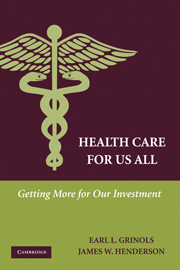Book contents
- Frontmatter
- Contents
- List of Tables
- List of Figures
- Preface
- Acknowledgments
- Executive Summary of the Targeted Intervention Plan
- PART I GOALS AND WORKING PRINCIPLES
- PART II BACKGROUND ECONOMICS AND ETHICS
- 4 Markets, VPOs, Government
- 5 Education, Charity, and the American Ethical Base
- PART III APPLICATION
- PART IV PROTECTIVE MEASURES
- A Top Ten Goals for the American Health Care System
- B Badly Done Insurance Programs Can be Worse Than No Insurance
- C Incentive Symmetry and Intervention Principle
- D Plan Workability
- E Market Power Response to Insurance
- Glossary and Definitions
- References
- Index
5 - Education, Charity, and the American Ethical Base
Published online by Cambridge University Press: 05 June 2012
- Frontmatter
- Contents
- List of Tables
- List of Figures
- Preface
- Acknowledgments
- Executive Summary of the Targeted Intervention Plan
- PART I GOALS AND WORKING PRINCIPLES
- PART II BACKGROUND ECONOMICS AND ETHICS
- 4 Markets, VPOs, Government
- 5 Education, Charity, and the American Ethical Base
- PART III APPLICATION
- PART IV PROTECTIVE MEASURES
- A Top Ten Goals for the American Health Care System
- B Badly Done Insurance Programs Can be Worse Than No Insurance
- C Incentive Symmetry and Intervention Principle
- D Plan Workability
- E Market Power Response to Insurance
- Glossary and Definitions
- References
- Index
Summary
While the people should patriotically and cheerfully support their Government, its functions do not include the support of the people.
President Grover Cleveland, 1893[The candidate] denies the right of any government to take from any man by means of taxation any money not needed for government expenses or to tax one man to enrich another.
Presidential Candidate William Jennings Bryan, 1896Ask not what your country can do for you, ask what you can do for your country.
President John Kennedy, 1961Summary: The issue is public provision of private goods. Education and government charity are prominent examples. What can be legitimately said? Most of us would agree that individuals have a duty of personal charity. The right amount of charity is the amount fully informed individuals would choose to give when properly balancing the needs of their families and those who depend on them against the needs of others – information that government can never fully know. Frequently, government knows the needs of recipients less well than the private sector and is able to exert less accountability than private sector agents of charity.
Historically, the American ethical base has posited that government welcomes, encourages, and facilitates charity but is not its proper agent. Consistently with the efficiency approach of Chapter 4, there may be exceptions for special circumstances when technological impediments to private sector action, such as capital and information constraints, are central to preventing knowledge of, or – in the case of widespread disasters – quick enough response to life-threatening events and circumstances.
- Type
- Chapter
- Information
- Health Care for Us AllGetting More for Our Investment, pp. 69 - 88Publisher: Cambridge University PressPrint publication year: 2009



